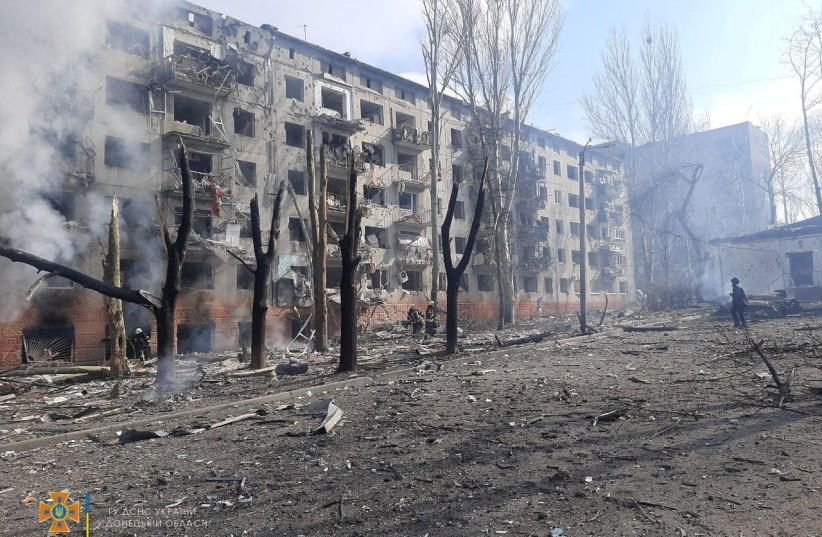The Israeli government has taken a non-committal position on Vladimir Putin’s war in Ukraine. True, it is going along with Western sanctions on Russia – as everyone must, lest they incur the risk of secondary sanctions themselves.
Plus, the Russian war of conquest, and the atrocities perpetrated on the occupied Ukrainian territories, are reminiscent enough of Hitler’s invasion of Poland and the Nazi crimes during World War II to make the blood of many Israelis boil.
But in general, Israel has acted as if events in Eastern Europe are of no immediate concern to Jerusalem.
Yet, this picture can change – and change quickly and dramatically – presenting an immediate existential threat to the State of Israel.
Putin’s 22-year rule in Russia has passed under the aegis of ensuring stability. Putin has been telling his electorate that after the tumultuous changes of the 1990s, he gave Russia a period of calm and predictability. In the name of that stability he eliminated most opposition and clamped down on political discourse, leaving himself as the sole ruler.

Democracies may appear messy, but they are fundamentally more stable than authoritarian regimes, in which nothing much happens day by day, but problems are allowed to accumulate and fester. Putin’s Russia is no exception.
Putin attacked Ukraine hoping for a quick victory and a boost to his popularity similar to what he got in 2014 when he annexed Crimea with resistance from Kyiv and only minor sanctions from the West.
This time, however, dogged Ukrainian resistance and massive sanctions mean that the war will be long and bloody, the Russian economy will be degraded and Putin’s authoritarian political system will become increasingly shaky. Putin may fall, ushering in a power struggle among his cronies.
While very little happens in the Russian political life on the surface, “under the carpet” as the Russians say, a plethora of security services, police forces, military departments, government agencies and oligarchs are jockeying for position and stabbing each other in the back. The public usually finds out about those hidden battles when this or that high official is dismissed or arrested.
NOW, HOWEVER, six weeks into the war, cracks are starting to appear. The withdrawal of Russian troops from around Kyiv has been strongly criticized by the more intransigent supporters of the war, with Chechen leader Ramzan Kadyrov emerging as the most vocal proponent of complete annihilation of Ukraine.
More recently, Kadyrov publicly upbraided Dmitry Peskov, Putin’s personal spokesman, questioning his patriotism.
Kadyrov and his father Akhmat fought the Russians during the first Chechen war of independence, but switched sides when the second war started in 1999. After Akhmat was assassinated in 2004, Ramzan became the president of the Chechen Republic within the Russian Federation.
He rules Chechnya with an iron fist, brooking no opposition to his rule. He used huge subsidies from Moscow to rebuild Grozny, the capital, and alleviate poverty among many ordinary Chechens. A self-described devout Muslim, he effectively introduced sharia law in Chechnya, ignoring the laws of the Russian Federation.
Kadyrov constantly swears loyalty to Putin, but at the same time he has created a private army and built a network of agents in the Chechen diaspora across Russia, both in business and criminal circles. His security services ban Russian law enforcement agencies from operating in Chechnya but operate openly inside Russia.
Kadyrov uses violence freely: his associates routinely kill his opponents both in Russia and abroad, and he is suspected of ordering the killings of journalist Anna Politkovskaya, convicted war criminal Colonel Yuri Budanov, and opposition politician Boris Nemtsov, all of whom were gunned down in Moscow by Chechen assassins.
True, Kadyrov is hated by Russia’s powerful security services and many people in the military. Yet, he is the only one who commands real military assets. He has claimed that his soldiers are fighting in Ukraine, but after suffering a few early casualties he has been careful to limit their participation to TikTok videos. Most Russians still dismiss the possibility of him coming out on top, but depending on how the post-Putin power struggle develops, any predictions are a fool’s game.
Kadyrov in the Kremlin will be a game-changer not just for Israel, but for the entire Middle East. He has repeatedly attacked Israel in his social media accounts, warning, for example, of a “major war” when Donald Trump announced his decision to move the US embassy to Jerusalem in 2017 and of “fateful consequences’’ for Israel when police stormed the al-Aqsa Mosque in 2021. In 2019 he wrote that Jews don’t allow Muslims to unite and called them “the chief enemies” of Islam.
For now, Kadyrov’s ability to become Putin’s successor may be considered far-fetched. But taking into account how such an outcome will change the balance of power in the Middle East and the world, it is something that Israel should keep a watchful eye on, especially as the war in Ukraine goes on.
The writer, who was born in Moscow and has lived in the US since 1974, is a board member of the Andrei Sakharov Foundation. The opinions expressed are his own.
